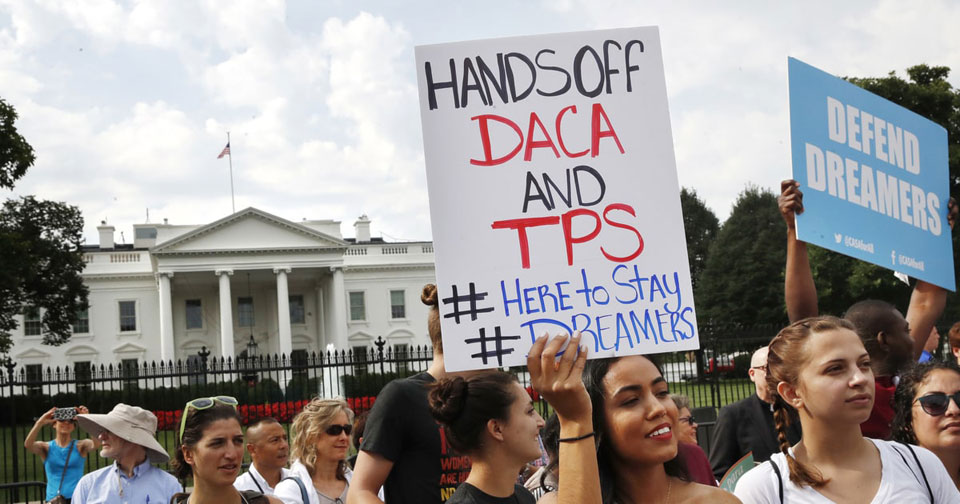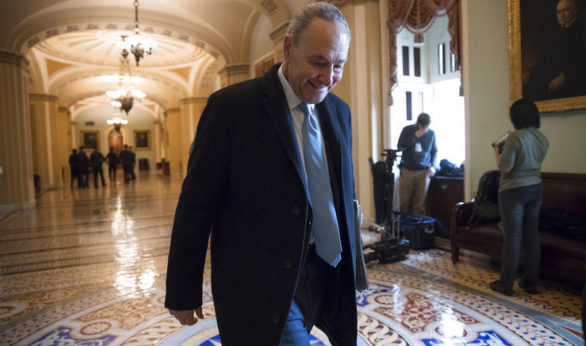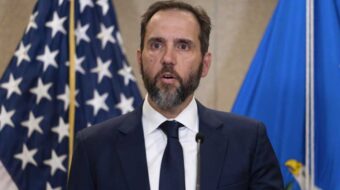
WASHINGTON—The Republican-run Congress dithered and Republican President Donald Trump blasted out partisan tweets – virtually calling Democrats traitors for not knuckling under to GOP demands – until Senate leaders agreed on a compromise to end a federal government shutdown that lasted from midnight on Jan. 19 through Jan. 22. The Senate approved the measure 81-18.
Still left hanging, however, is the fate of 690,000 Dreamers, who have to wait until at least Feb. 8 until they hear further substantial news about their status. Trump has cancelled the DACA program that allows them to remain in the country legally.
“Millions of us have no protection at all and 850 more of us lose protections every week,” read a statement issued by United We Dream. “For us, the results of this debate means the difference between freedom and confinement between life and death. We grew up in this country yet we are being psychologically tortured by these cruel men.”
The compromise is a money bill to fund the government for three weeks. It also contains a GOP promise to include legislation Senate Democrats demanded, to let the Dreamers – the undocumented people brought to the U.S. as kids – stay here for good. That would go in the next money bill.
But if lawmakers can’t include Dreamer language in that measure, Senate Majority Leader Mitch McConnell, R-Ky., who has taken an increasingly hard line against the Dreamers, promised to separately bring up the Dream Act or an equivalent measure a bipartisan group of senators is drafting.
The 3-week compromise money bill also includes money for children’s health insurance. Whether the compromise will stick is open to question: Anti-Latino GOP hardliners, led by Trump and the radical right House Freedom Caucus, have yet to be heard from.
“The Republican leader and I have come to an arrangement; we will vote today to reopen the government,” Senate Minority Leader Chuck Schumer announces on the floor of the Senate Monday, the third day of what Democrats have called “The Trump Shutdown.”
The deal will take the padlock off the federal government until Feb. 8, Schumer said, during which time the two sides will supposedly try to achieve a longer lasting or permanent agreement. If they have not done this by Feb. 8, Schumer said he has assurances from McConnell that the Senate will immediately move on to debate on legislation to protect Dreamers who face deportation now because of President Trump’s decision to end the DACA program.
The temporary fix that the parties agreed to on Monday, Schumer said, guarantees full funding of the Children’s Health Insurance Program for six years. Only two days ago the Senate’s GOP majority leader, Mitch McConnell, had tried to force a “Sophie’s Choice” by telllng Dems that they could choose between CHIP and DACA but could not have both.
House Speaker Paul Ryan, R-Wis., meanwhile, is still saying he refuses to consider anything unless he has a majority of GOPers behind it, even though the Dream Act would pass with a bipartisan majority there and even though polls show overwhelming support nationwide for the Dreamers.
But hate-filled statements during House debate over the weekend featured Republicans screaming that Democratic support for “illegal aliens” – their words — was “taking away money for our troops.” And rabid ads from their congressional campaign committee pushed the same theme. Left unmentioned: Trump’s demand for money for his Wall along the border with Mexico.
Schumer had leverage for the deal he announced today because the 47 Senate Democrats and two independents provided enough votes to keep a filibuster going to block any money bill. McConnell’s prior try, a 4-week money bill with no Dream Act, failed two days before.
“After several discussions, offers and counteroffers, the Republican leader and I have come to an arrangement. We will vote today to reopen the government” and “to continue negotiating a global agreement,” Schumer said.
The Senate Democrats want to put a Dream Act variation pushed by a bipartisan foursome led by Sens. Lindsay Graham, R-S.C. and Richard Durbin, D-Ill., in the next money bill. If they can’t, then the Senate will consider the Dream Act all by itself and “the process will be neutral and fair to all sides,” Schumer said.
Before the compromise was announced, some government functions closed completely as of noon Eastern Time on Jan. 22, after workers were told to come in early Monday morning to shut down their offices. Other, “essential” workers, such as the military, corrections officers, VA nurses and air traffic controllers, stayed on the job, but with no promises when or if they would ever get paid.
Some national parks closed over the weekend, as did all the national park concessions, and no trash was picked up. Several hundred Jan. 22 OSHA inspections of unsafe and unhealthy job sites were cancelled.
The Postal Service fully functioned, Letter Carriers President Fredric Rolando said, because it gets its money from stamp sales and other sources, not from congressional money bills.
But non-federal workers whose firms or organizations exist on government grants – such as the University of Maryland planetary scientist interviewed at the Women’s March whose project depends on a NASA grant – don’t know if their money will be there.
Federal workers’ unions slammed the shutdown, urging laid-off and locked-out workers to call their lawmakers on their own time and their own dime to lobby for passage of a money bill to reopen the government. And the Treasury Employees added they would lobby for retroactive back pay for workers, both those locked out and those forced to toil unpaid.
“In a government shutdown, it is the American people who pay the price,” said J. David Cox, a retired VA psychiatric nurse who heads the feds’ largest union, the Government Employees (AFGE). His union posted toll-free numbers for people to call their lawmakers and campaign against the shutdown: 844-669-5146 in the D.C. area and 888-775-3148 outside it.
“Congress and the administration have only themselves to blame for failing to keep the federal government open. This shutdown is a direct result of lawmakers continuing to punt the ball instead of having the courage to make the tough decisions that we elected them to do,” Cox added.
“Federal employees want to go to work. They believe in their mission and want to provide quality services to the American people. But now, 850,000 of them will report to work on Monday, only to be told to go home, while a million or more will be forced to work without pay for as long as this shutdown drags out.
“Every day that this shutdown continues, more Americans will begin to feel the effects as federal offices close their doors to the public, the government stops paying its bills, and millions of government workers and military service members no longer get paid.
“Federal employees are regular middle-class workers who have families to support and bills to pay, and their paychecks should not be yet another casualty of a shutdown,” Treasury Employees President Tony Reardon added, announcing the lobbying for the retroactive back pay. “A political stalemate should not cause them to get behind on their mortgage or run up more debt on their credit cards.”
“We’ve said it before and we’ll say it again,” wrote editor David Groves in The Stand, the online newspaper of the Washington State Labor Council. “There was (still is?) a bipartisan deal to keep the government open, but Trump decided he was prepared — even eager— to shut the government down because the deal didn’t do enough to keep people of color from what he considers to be “shithole countries” out of America. Trump could end this today if he just accepted the bipartisan deal and declared victory (like he will, no matter what).”

Not everyone on the progressive side of the aisle was happy with today’s compromise, however.
“Put simply, delay means deportations,” said United We Dream, the lead organization of the Dreamers. “Immigrant youth aren’t interested in scoring political points, we are literally fighting to save lives.”
“This is what happens when Republicans control all three branches of government. They are using their power to hurt kids and tear families apart. Our side needs to fight and win back government in 2018 so we can stop this madness,” e-mailed Stephanie Taylor, co-founder of the Progressive Change Campaign Committee.
“Today’s cave by Senate Democrats — led by weak-kneed, right-of-center Democrats — is why people don’t believe the Democratic Party stands for anything. These weak Democrats hurt the party brand for everyone and make it harder to elect Democrats everywhere in 2018. Millions of people — Dreamers and their family members — are hurting and in limbo, not knowing if they can stay together. Progressives will be trying hard to win back Congress in 2018, knowing that the best way to win is to nominate strong and inspiring Democrats who will give voters a reason to show up and vote Democratic.”
John Wojcik contributed to this article.

MOST POPULAR TODAY

High Court essentially bans demonstrations, freedom of assembly in Deep South

Zionist organizations leading campaign to stop ceasefire resolutions in D.C. area

U.S. imperialism’s ‘ironclad’ support for Israel increases fascist danger at home


UN warns that Israel is still blocking humanitarian aid to Gaza






Comments